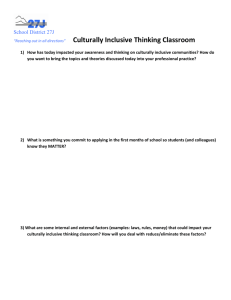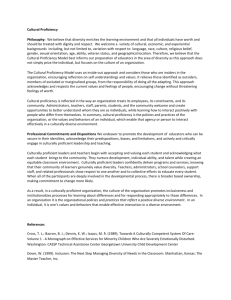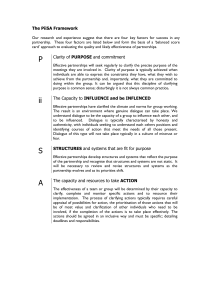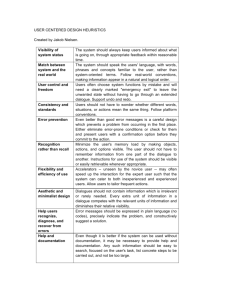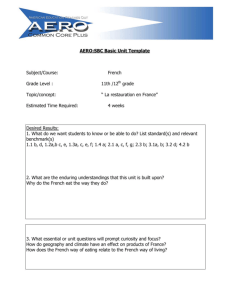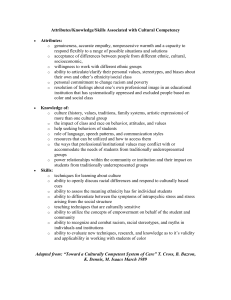Report - Ypsilanti Community Schools
advertisement
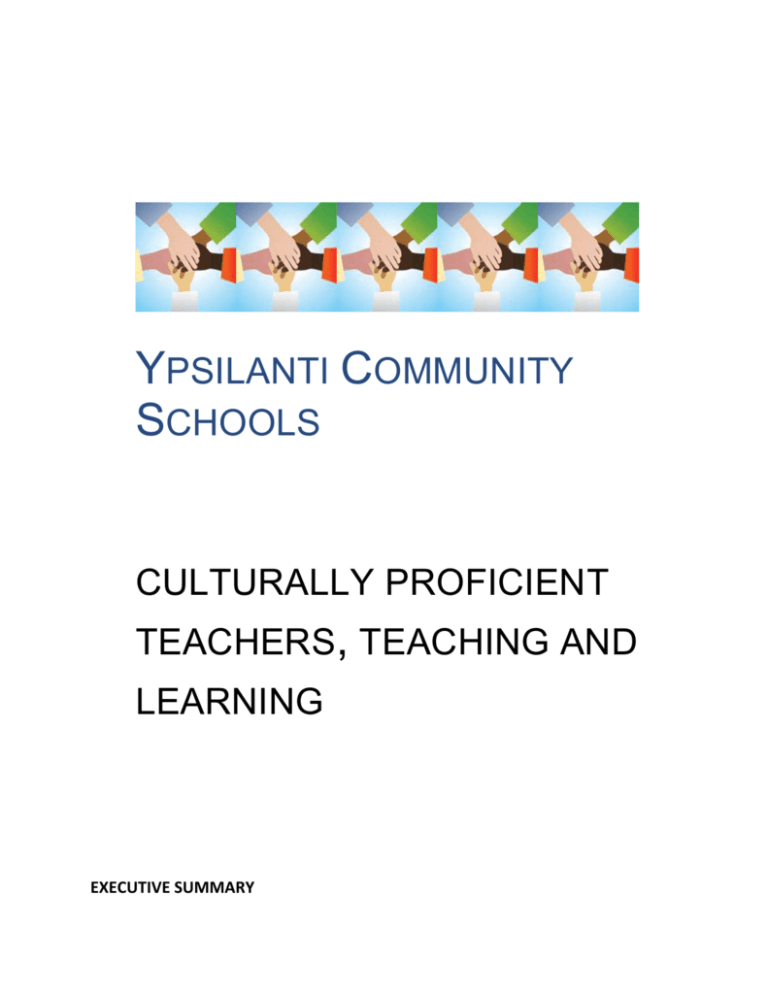
YPSILANTI COMMUNITY SCHOOLS CULTURALLY PROFICIENT TEACHERS, TEACHING AND LEARNING EXECUTIVE SUMMARY RECOMMENDATION In order to ensure the students of YCS have a first-class educational opportunity, enriched with the honor and respect of their individual culture, traditions and experiences, we recommend that the Board of Education adopt a framework that establishes: -A definition of a culturally proficient educator as identified in the Teacher Commitments -A comprehensive professional learning series that provides training and support for the entire school community to become culturally proficient Overview and Key Areas of Focus It is imperative that the teachers (word used broadly to include all adults in the learning community), teaching (pedagogy and instructional methods, i.e. how conceptual knowledge is developed and managed in the classroom in context to the material being taught) and learning (the written and taught curriculum and curricular resources used to develop prior knowledge and incorporate new learning) at Ypsilanti Community Schools meet the unique needs of this school community. This advisory group based our recommendations on the research and best-practices that will provide a critical understanding and knowledge of the skills/experiences and affirming attitude necessary for those teaching in a culturally and economically diverse community. Our recommendations were focused on the following two key areas: 1. What are the approaches, practices, responsibilities and actions of a Culturally Proficient educator? How do these general approaches create conditions that foster learning and support diverse students? 2. What professional development and on-going support will be needed to ensure educators have received sufficient training to become or remain culturally proficient? Process & Key Steps to Recommendation January 28- Initial meeting in which we had close to sixty participants. Participants were given information about each of the three areas of the culture and climate work for YCS. At the end of the meeting two articles were given to participants on building positive culture and climate. In addition, participants were asked to specify which sub-committee they were interested in joining. February 7- First meeting for Culturally Proficient Teachers, Teaching and Learning subgroup. After reading an article on building culture we discussed what are our key “hope fors” in the new district as it relates to behaviors, actions and approaches that will lead to cultural proficiency. February 28- We broke into three groups and jig-sawed three articles, 1) The Culturally Responsive Teacher, 2) Colorblindness: the New Racism and 3) White Benefits: Middle Class Privileges. Page 2 The Understanding Race Project professional learning proposal was introduced. As homework, participants were asked to review the proposal in light of the research reviewed. In addition, they were to complete the personal benefits checklist. Discussion: Reading & Proposals/Recommendations – Do they (and how do they) directly relate to Guiding Principles as set forth by Ypsilanti Community Schools Board of Education? March 7- Shared key information from articles previously read. Timeline for board recommendation was reviewed. Read excerpt from Critical Knowledge for Diverse Teachers and Learners. Chapter TwoKnowledge, Skills and Experiences for Teaching Culturally Diverse Learners: A Perspective for Practicing Teachers. The remainder of the meeting was spent taking all of the research, dialogue, experiences and discussion and formulating a definition of WHAT IS A CULTURALLY PROFICIENT teacher. This definition will serve as a companion document to the teacher commitments and become a part of our recommendation to the BOE. Homework: Continue to analyze the UofM proposal in light of our definition of what it means to be a Culturally Proficient teacher. Does this PD model support this approach? Qualitative evaluation of UofM training was also distributed. A draft definition of Cultural Proficient was developed. The following question was posed: What are the general approaches of a Culturally Proficient teacher to create classroom conditions that foster learning and support diverse learners? As a result of our research and discussion seven (7) approaches were tentatively identified. Homework: Consider how the University of Michigan proposal intersects and supports the seven approaches identified. Research additional professional development models available throughout the state and country. March 14- University of Michigan Intergroup Relations team presented their proposal. Participants discussed the strengths and weakness of the proposal and asked presenters additional questions. A large discussion was had about the benefits in the parent and community component of the training model. We continued to review and revise the seven approaches that will define the behaviors, practices and actions of a Culturally Proficient teacher. March 28-We met to further analyze each element of the UofM professional development components in light of a) the core values and guiding principles set forth by the YCS Board of Education, b) Seven approaches, practices, actions and responsibilities of a culturally proficient teacher developed, and c) what are the strengths and challenges of the model itself. We also discussed what gaps exist and how they should be addressed? Page 3 The seven approaches were finalized and professional development prepared for recommendation to the Board of Education. RECOMMENDATION #1- ADOPT CULTURALLY PROFICIENT EDUCATOR DEFINITION Practices, Actions Approaches and Responsibility of a Culturally Proficient Educator A Culturally Proficient Educator will: Definition or Approach 1- build relationships with students and families by actively learning about their lives 2- acknowledge students make meaning by integrating new ideas into their own thinking and honoring their culture, prior knowledge and experiences 3- develop critical thinking skills by encouraging students to get actively involved with issues of power, language, activism, equity, inequity, access, race and racism explicit in the intended and taught curriculum 4- develop a shared sense of responsibility by creating a community of learners Examples Conducting home and/or community visits. Gathering student and parent input. Attend non-academic student events. Make learning experience relevant by starting with experiences that are familiar to the student (based on their neighborhood, home, food, beliefs, culture, ancestors, etc.) Allowing students to conduct surveys, opinions polls, and debate and engage in problem solving for issues as they arise or to be proactive when appropriate. Designate times for student dialogue and discussion. Support processes of restorative justice and conflict Page 4 resolution. 5- transcend their own cultural bias by being (or willing to become) sociocultural conscious. Defined as: awareness that a person’s worldview is not universal but profoundly influenced by life experiences 6- establish rules of engagement (community norms) to build inclusivity 7- actively promote student voice and student leadership Actively engage in professional learning, book studies, and community events. Work with students to establish, review, post and integrate norms into instruction Find formal (through arts, assignments and journals) and informal (co-curricular) ways for students to honor their culture RECOMMENDATION #2- ADOPT DISTRICT WIDE CULTURALLY PROFICIENT PROFESSIONAL LEARNING Creating Culturally Proficient Communities: The Ypsilanti Racial and Economic Justice Project Project Leaders-Dr. Kelly Maxwell and Dr. Shayla Griffin, University of Michigan Five-Year Project Goals BUILDING CAPACITY Train all educators (administrators, teachers, and paraprofessionals) in Ypsilanti Community Schools Train all non-instructional staff Train a subset of parents and community members Provide programming and development for students Rigorously and regularly evaluate the impact and outcomes of the project PROJECT CONTENT Page 5 The goal of this project is to provide educators, non-instructional staff, community members, and students with the cultural proficiency to create and maintain racially and economically just classrooms and schools through the development of: Personal knowledge and awareness Increase knowledge of how race and class matter in the education system Increase awareness of personal bias related to race and class Increase awareness of how race and class impact personal educational practice Dialogue and Relationship Building Skills Develop skills to engage in dialogue about race and class with students and colleagues Develop skills to build successful relationships with diverse groups of students and colleagues Racially and Economically Just Curriculum and Pedagogy Learn models of economically & racially just education Develop concrete lessons appropriate for grade-level and subject area Develop pedagogical approaches that are responsive to diverse groups of students Long-Term Action Plans Assess and evaluate school’s needs at multiple levels of the system Develop plans of action for sustaining racial and economic justice at the school and districtlevels Build and sustain a community of social justice practitioners Five-Year Project Design The following groups will be trained in cohorts over the course of a five-year timeframe: 1. 2. 3. 4. All Administrators, Teachers and Paraprofessionals All Non-Instructional Staff Subset of parents and community members Students and student leadership DESCRIPTION OF PROJECT BY YEAR Initial School Assessment and Pre-Evaluation (Years 1-2) Page 6 All schools in the district Fostering Racial and Economic Justice Training (Years 1-4) 4 full-days of training during the school year 4 series for up to 120 total educators per year All educators in the district (up to 480) over 5 years Train-the-Trainer Summer Institute (Years 1-4) 5 full-days of training during the summer 2 series for up to 50 total educators per summer Up to 200 educators over 5 years Refresher Training & Implementation Support (Years 2-5) 2 full-days of training during the school year 1 series for up to 50 total educators per year Up to 200 educators over 5 years Support for action plans and curricular and pedagogical change DESCRIPTION OF PROJECT BY GROUP 1. Overall District Initial School Assessment and Pre-Evaluation (Years 1-2) On-site visits to each participating school Pre-Assessment of each school’s multicultural and social justice initiatives Pre-Assessment of each school’s needs, strengths, and challenges regarding cultural proficiency Relationship building with school leaders 2. ALL Administrators, Teachers and Paraprofessionals Fostering Racial and Economic Justice Training (Years 1-4) Development of content knowledge Page 7 Development of personal awareness & reflection Practice engaging in dialogue about issues of race and class with students and colleagues Development of action plans to address race and class in curriculum and pedagogy Train-the-Trainer Summer Institute (Years 1-4) Deepening content knowledge, awareness & personal reflection Continued creation of relevant lesson plans and development of culturally proficient pedagogical approaches Development of action plans to address race and class at the school-level Development and practice of facilitation skill in order to lead further social justice initiatives at the school-level Refresher Training & Implementation Support (Years 2-5) Training for individuals from previous year cohort Deepening content knowledge & awareness Sharing of and feedback on social justice initiatives to date Support for implementation of action plans Follow-Up Evaluation at school level 3. ALL Non-Instructional Staff and subset of parents and community members Introduction to Diversity and Justice: A Training (Years 1-4) One full-day of training Up to 240 non-instructional staff over 5 years Up to 240 parents/community members over 5 years Introduction to content on racial and economic justice Development of personal awareness Practice engaging in non-violent communication and relationship building across difference 4. Students and Student Leaders Student voices present at Educator, Staff, & Community Trainings Page 8 Co-curricular Programming In-class discussions/dialogue facilitation Near peer dialogue facilitation by UM students Extra-Curricular Programming Afterschool intergroup dialogue program Near peer dialogue facilitation by UM students Course Development Consult with teachers to develop a social justice dialogue course for middle and/or high school students EVALUATION OF PROJECT Assessing Short-Term and Long-Term Impact Initial School Assessment and Pre-Evaluation of each school Evaluation of every training series Second Year On-Site Follow-Up Evaluation with each cohort Final Year Overall Project Evaluation Page 9 Creating Culturally Proficient Communities: The Ypsilanti Racial and Economic Justice Project Review of Proposal Focus Group and/or Connected to which Guiding Principles of YCS Supporting which Core Values of YCS Extensive data gathered Comprehensive in nature Design Train the Trainer model High expectations Evidence-based bet practices Family and community partnerships Student voice and empowerment Responsibility efficiency and financial viability Creativity and Innovation Diversity High Expectations for All Students Responsibility Respect Resilience Student Voice and Empowerment Vibrant Family and Community Partnerships Strong Assessment Data-Driven Stake holder involvement Transparency High expectations Evidence-based bet practices Family and community partnerships Student voice and empowerment Responsibility efficiency and financial viability Creativity and Innovation Diversity High Expectations for All Students Responsibility Respect Resilience Student Voice and Empowerment Vibrant Family and Community Partnerships High expectations Evidence-based bet practices Family and community partnerships Creativity and Innovation Diversity High Expectations for All Students Strengths of Design Design Element Administrators, Teachers Paraprofessionals/Overall design Administrators, Teachers Paraprofessionals/Initial School Assessment and Pre-Evaluation Administrators, Teachers Paraprofessionals/Train the Trainer Summer Encourages Sustainability Institute Student voice and empowerment Responsibility efficiency and financial viability Responsibility Respect Resilience Student Voice and Empowerment Vibrant Family and Community Partnerships Encourages Sustainability Administrators, Teachers Paraprofessionals/Refresh er and implementation support High expectations for all students Evidence-based bet practices Family and community partnerships Student voice and empowerment Responsibility efficiency and financial viability Creativity and Innovation Diversity High Expectations for All Students Responsibility Respect Resilience Student Voice and Empowerment Vibrant Family and Community Partnerships High expectations for all students Evidence-based bet practices Family and community partnerships Student voice and empowerment Responsibility efficiency and financial viability Creativity and Innovation Diversity High Expectations for All Students Responsibility Respect Resilience Student Voice and Empowerment Vibrant Family and Community Partnerships High expectations Evidence-based bet practices Creativity and Innovation Diversity Non-instructional staff Parent and community Inclusive of all staff Inclusive of the broader community Page 11 members Supports home-school Family and community partnerships Student voice and empowerment connection Responsibility efficiency and financial viability High Expectations for All Students Responsibility Respect Resilience Student Voice and Empowerment Vibrant Family and Community Partnerships Student involvement Near peer High expectations Evidence-based bet practices Family and community partnerships Student voice and empowerment Responsibility efficiency and financial viability Creativity and Innovation Diversity High Expectations for All Students Responsibility Respect Resilience Student Voice and Empowerment Vibrant Family and Community Partnerships Assessment of short-term and long-term impact Evaluation itself High expectations Evidence-based bet practices Family and community partnerships Student voice and empowerment Responsibility efficiency and financial viability Creativity and Innovation Diversity High Expectations for All Students Responsibility Respect Resilience Student Voice and Empowerment Vibrant Family and Community Partnerships Page 12 Challenges and Opportunities Opportunity- work will impact and complement restorative justice and conflict resolution practices Opportunity- work will overlap with co-curricular opportunities for students Challenge-sustaining work through changes of leadership, teaching staff, etc. Challenge-Accountability. How will this be a part of professional responsibilities of adults? How will adult behaviors and antecedents become a part of the culture? What will be the formal and informal expectations? How will they be communicated to staff? Opportunity-There is no model as comprehensive as this that currently exists. YCS will be seen as creative and innovative and taking the lead in this very important work. Considerations 1) How does this impact character education work and professional learning? 2) How does this overlap with co-curricular opportunities? 3) How will adult behavior and antecedents become a part of the professional culture? Expectations? Evaluation? Administrator look fors? Instructional coaching for ongoing job embedded professional learning? 4) How will administrators (at every level) be supported to encourage and ensure sustainability (i.e. changes in district leadership, principals, board members) Participants Sarena Shivers, WISD (co-facilitator) Aaron Rose, Administrator YPS Derek Shelton, Teacher WRCS (co-facilitator) Tim Rood, Teacher YPS Candice Brown, Teacher YPS Kier McLemore, parent/business Renee Smith, Teacher WRCS Maria Cotera, parent Njoki Kamuyu, retired teacher RJ Quiambao, WRCS Teresa Corneilson, WRCS Clarence Thomas, WISD Tiffany Sims, community member Linda Jones, retired teacher References Culturally Proficient Educator Definition Irvine, J.J. (1997) Critical Knowledge for Diverse Teachers and Learners. Washington, D.C.: American Association of Colleges for Teacher Education. Kivel, P. (2002) Uprooting Racism: How White People Can Work for Racial Justice. Canada: New Society Publishers. Ladson-Billings, G. (1994). The Dreamkeepers: Successful teachers of African American children. San Francisco: Jossey-Bass Publishers. Milner, R. H. (2010). Start Where You Are, but Don't Stay There: Understanding Diversity, Opportunity Gaps, and Teaching in Today's Classrooms. Cambridge: Harvard Education Press. Scruggs, A. O. Colorblindness: the New Racism?, 36 Fall 2009 http://www.tolerance.org/magazine/number-36-fall-2009/feature/colorblindness-new-racism Villegas A.M., Lucas T. (2007) The Culturally Responsive Teacher. Educational Leadership, 64 (6), 28-33. Professional Development Model This model is based on theories of intergroup dialogue, multicultural education, culturally responsive teaching, and social justice education, all which have proven success. Adams, M., Bell, L. A., & Griffin, P. (2007). Teaching for diversity and social justice. New York: Routledge. Alimo, C. J. (2012). From dialogue to action: The impact of cross-race intergroup dialogue on the development of white college students as racial allies. Equity & Excellence in Education, 45(1), 36. Allport, G. W. (1954). The nature of prejudice. Cambridge, MA: Perseus. Banks, J. A. (2007). Educating citizens in a multicultural society. New York: Teachers College Press. Dessel, A. (2010). Prejudice in schools: Promotion of an inclusive culture and climate. Education and Urban Society, 42(4), 407. DeTurk, S. “The Power of Dialogue: Consequences of Intergroup Dialogue and Their Implications for Agency and Alliance Building.” Communication Quarterly, 2006, 54(1), 33-51. Gay, G. (1997). The relationship between multicultural and democratic education. Social Studies, 88(1), 5–11. Gay, G., & Kirkland, K. (2003). Developing cultural critical consciousness and self-reflection in preservice teacher education. Theory into Practice, 42(3), 181–187. Gregory, A., Noguera, P. A., & Skiba, R. J. (2010). The achievement gap and the discipline gap: Two sides of the same coin? Educational Researcher, 39(1), 59. Griffin, S. R., Brown, M., & Warren, N. M. (2012). Critical education in high schools: The promise and challenges of intergroup dialogue. Equity & Excellence in Education, 45(1), 159. Gurin, P., Nagda, B.A., & Sorensen, N. (2011). Intergroup Dialogue: Education for a Broad Conception of Civic Engagement. Liberal Education. Washington, D.C.: Association of American Page 14 Colleges and Universities. Gurin-Sands, C.,Gurin, P., Nagda B.A. & Osuna, S. (2012): Fostering a Commitment to Social Action: How Talking, Thinking, and Feeling Make a Difference in Intergroup Dialogue, Equity & Excellence in Education, 45:1, 60-79. Gutierrez, L., Dessel, A., Lewis, E., & Spencer, M. (2012). Principles, Skills and Practice Strategies for Promoting Multicultural Communication and Collaboration. In Weil, M., Reisch, M., & Ohmer, M. The Handbook of Community Practice, 2nd Edition. Sage Publications. Howard, G. R. (2006). We can't teach what we don't know: White teachers, multiracial schools. New York: Teachers College Press. Kendall, F. E. (2006). Understanding white privilege: Creating pathways to authentic relationships across race. New York: Routledge. Ladson-Billings, G. (1994). The Dreamkeepers: Successful teachers of African American children. San Francisco: Jossey-Bass Publishers. Ladson-Billings, G. (1995). But that's just good teaching! The case for culturally relevant pedagogy. Theory into Practice, 34(3), 159. Lewis, A. E. (2003). Race in the schoolyard: Negotiating the color line in classrooms and communities. New Brunswick, N.J.: Rutgers University Press. Maxwell, K.E., Nagda, B., & Thompson, M. (Eds.). (2011). Facilitating intergroup dialogues: Bridging differences, catalyzing change. Sterling, VA: Stylus Publishing. Nagda, B.A., Gurin, P., Sorensen, N., & Zúñiga, X. (2009). Evaluating intergroup dialogue: Engaging diversity for personal and social responsibility. Diversity & Democracy, 12 (1), 4-6. Nieto, S. (2010). The Light in their eyes: Creating multicultural learning communities, 10 th Anniversary Edition. New York: Teachers College Press. Noguera, P. A. (2008). The trouble with black boys: Essays on race, equity, and the future of public education. San Francisco: Jossey-Bass. Ornstein, A. C. (2007). Class counts: Education, inequality, and the shrinking middle class. Lanham, MD: Rowman & Littlefield Pub. Group, Inc. Pettigrew, T. F. (1998). Intergroup contact theory. Annual Review of Psychology, 49, 65–85. Pollock, M. (2004). Colormute: Race talk dilemmas in an American school. Princeton, N.J.: Page 15 Princeton University Press. Pollock, M. (2008). Everyday antiracism: Getting real about race in school. New York: New Press :Distributed by W.W. Norton & Co. Sacks, P. (2007). Tearing down the gates: Confronting the class divide in American education. Berkeley: University of California Press. Schoem, D. L., & Hurtado, S. (2001). Intergroup dialogue: Deliberative democracy in school, college, community, and workplace. Ann Arbor: University of Michigan Press. Schoem, D., Hurtado, S., Sevig, T., Chesler, M., & Sumida, S. (2001). Intergroup dialogue: Democracy at work in theory and practice. In D. L. Schoem & S. Hurtado (Eds.), Intergroup dialogue: Deliberative democracy in school, college, community and workplace (pp. 1–21). Ann Arbor, MI: University of Michigan Press. Sleeter, C. E. (1992). Keepers of the American dream: A study of staff development and multicultural education. Washington, D.C.: Falmer Press. Spencer, M. S., Abdullah, S., Brown, M., & Griffin, S. (2008). Outcome evaluation of the intergroup project. Small Group Research, 39(1), 82. Tatum, B. D. (2007). Can we talk about race?: And other conversations in an era of school resegregation. Boston, Mass.: Beacon. Zuniga, X., Ed, Nagda, B. A., Ed, Chesler, M., Ed, & Cytron-Walker, A., Ed. (2007). Intergroup dialogue in higher education: Meaningful learning about social justice, volume 32, number 4. ASHE Higher Education Report, 32(4), 1. Zúñiga, X. (2007). Intergroup dialogue in higher education: Meaningful learning about social justice. San Francisco, Calif.: Wiley Subscription Services at Jossey-Bass. Zu n ́ iga, X., Nagda, B. A., & Sevig, T. D. (2002). Intergroup dialogues: An educational model for cultivating engagement across differences. Equity and Excellence in Education, 35(1), 7–17. Page 16
